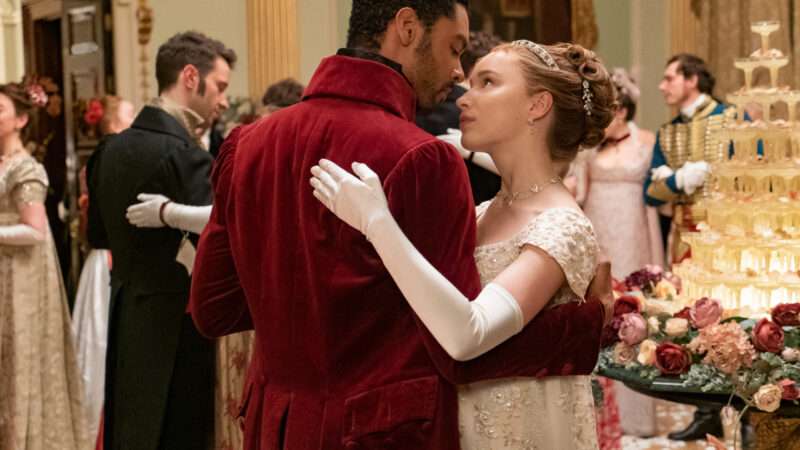
Netflix has filed a lawsuit against the creators of The Unofficial Bridgerton Musical, alleging copyright infringement. The musical, which won a Grammy this year, has gained popularity (and sold out shows) since its inception on TikTok in January 2021.
The lawsuit alleges that the musical's creators, Abigail Barlow and Emily Bear, violated the company's copyright and that the pair proceeded with productions of the musical despite repeated warnings from Netflix. In the lawsuit, Netflix claims that Barlow and Bear's musical "stretches 'fan fiction' well past its breaking point," and violates Netflix's intellectual property rights.
Netflix also alleges that Barlow and Bear "misrepresented to the audience that they were using Netflix's BRIDGERTON trademark 'with Permission,' while Netflix vigorously objected," as well as producing and promoting their own Bridgerton-themed merchandise. The pair also frequently used verbatim excerpts of dialogue from the show in song lyrics and titles.
"Netflix owns the exclusive right to create Bridgerton songs, musicals, or any other derivative works based on Bridgerton," said Netflix in the suit. "Barlow & Bear cannot take that right—made valuable by others' hard work—for themselves, without permission. Yet that is exactly what they have done."
Both showrunner Shonda Rhimes and Bridgerton novel series author Julia Quinn expressed dismay over the musical's production. According to NBC News, Quinn said in a statement that while she was "flattered" by the early version of the musical on TikTok, but that "there is a difference … between composing on TikTok and recording and performing for commercial gain." Rhimes expressed similar sentiments, writing in a statement that "what started as a fun celebration by Barlow & Bear on social media has turned into the blatant taking of intellectual property solely for Barlow & Bear's financial benefit."
While the musical's creators are in hot water, the legal reasoning has only partially to do with the commercial impact of their work. Rather, what likely makes their work copyright infringement, rather than a protected instance of fair use, relates to a four-pronged legal doctrine that acts as a guide for judges deciding the validity of a copyright infringement claim. According to Columbia University's Copyright Advisory Services, these "four factors" examine the purpose and character of the use, the nature of the copyrighted work, the amount of the portion used, and the effect of the use on the potential market for the work. Barlow and Bear seem to come down on the wrong side of these legal guidelines.
Legally, things do not look good for Barlow and Bear, as their musical closely resembles common classes of derivative—or copyright-violating—work. "This is the super down-the-middle-of-the-plate hardcore violation of copyright law," Richard Epstein, a professor at New York University's law school, tells Reason.
"For example, take a novel and translate it into another language. That's derivative. Take a book and turn it into a TV series. … And so Netflix had to license Julia Quinn's books to write their series," said Kristelia Garcia, a law professor at the University of Colorado, during an appearance on the Slate podcast ICYMI. "Frankly, I'm inclined to think that a musical based off of an audiovisual work like a film is leaning towards a derivative work because it takes the content and recasts it in some new way."
Garcia also noted that the musical's use of verbatim dialogue spells legal trouble for the pair: "Even if a court or a jury was to find fair use for the musical as a whole, I would without a doubt think that those particular samples of the dialogue would need to be either licensed or removed from the tracks."
The post Netflix Files Copyright Lawsuit Against Creators of Unofficial Bridgerton Musical appeared first on Reason.com.







